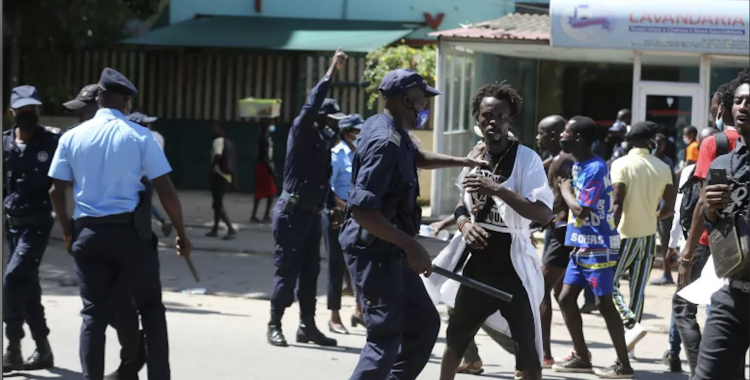The "high" price of fees and emoluments in public and private institutions and "lack of quality in education" were some of the purposes of the demonstration promoted this Saturday, in Luanda, by the Angolan Students Movement (MEA).
More than 250 students and members of the civil society concentrated in the Heroines Square, where before the beginning of the march the students expelled the president of the National Youth Council (CNJ), Isaías Kalunga, who had to leave escorted by the "fury" of the youth.
"Kalunga out" was the cry of protest against the presence of the CNJ leader, who did not escape even a bottle of water that was thrown at him from behind.
Under police supervision and protection, the march began punctually, at 1 pm, and as the protesters walked along Ho Chi Min Avenue they chanted slogans such as "education is a right and should not be sold" or "don't kill the dream of the youth, studying is a right".
With several stops along the way, the march skirted the 1.º de Maio square, but it was at the entrance of Nicolau Gomes Spencer Street that the mood of the demonstrators changed, as some wanted to march to the headquarters of the Ministry of Finance and others to the square of the Ministries, 500 meters away, where a "manifesto" would be read.
The increased tension led the police to reinforce their forces, with officers from the rapid intervention police and the canine brigade, as the students broke through the first police cordon, but could not break through the second cordon.
The police tried to calm down some demonstrators dissatisfied with the change in the route of the march, but ended up dispersing them with gunfire and tear gas, causing panic among demonstrators and passers-by.
At that moment traffic came to a halt, some demonstrators did not escape the police charge and others were detained.
The MEA promoted the march also to "demand the repeal" of Presidential Decree 124/20 of May 4, which exacerbates the rise in tuition and emoluments at educational institutions.
"We came to demand that the government revoke the new decree because it is a danger to Angolan society, because most young people are unemployed," said student Luís Manuel, speaking to Lusa.
Attending the 2nd year of the Law course, in a private institution, the student also considered that the referred decree "violates the gratuity of education.
"We also demand better quality of education and the implementation of school meals, as provided for in the Basic Law of Education," he added.
For Dumilton Silvestre, a student of Mining Engineering at the Agostinho Neto University (UAN), the largest public university in the country, the alluded presidential decree "aggravated" the price of the appeal exams from 1500 kwanzas to 5000 kwanzas.
"But now there has been an exponential rise of the appeal to 5000 kwanzas. Given that most of the population lives below the poverty line, doing higher education here in Angola is a tremendous sacrifice," he lamented.
"So, I came here to demonstrate so that the Government could watch over this, because we should never admit such an exponential rise," said the university student.
Teresa Luther King also "repudiated" the decree that approves the payment of tuition, fees and emoluments in public educational institutions, stating that "the State must stop killing the will of poor young people."
According to the student, many young people in the country "are seeing their dreams frustrated" as a result of the provisions of the decree that "penalizes, above all, low-income families."
"Policies must be created that go in line with our social reality, we also deserve to dream," Teresa Luther King argued before the march began, which was later dispersed by police.







